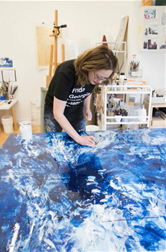These are my notes from visiting artist Ann-Marie James on making a living as an artist.
James took an unpaid work experience placement at a museum, and joined a group for young people interested in the arts at Kettle’s Yard.
Don’t underestimate the use of collaboration and developing your skills as a collaborator. These connections and skills can help you later on in your career as an artist.
Finding out what kind of artwork you want to make can take a long time. It can take a while for an idea and the expression to come together.
If you come away from a degree with just one core idea or a key interest to explore and carry further, then that is a lot. As it can take a long time to find our voice.
Write to galleries and ask if they have any unpaid internships, you might get a job where you can gain experience on how a gallery is run. James started working an unpaid internship where she worked one day a week, this lead on to further work in London working at other galleries and museums and paying jobs.
In her final year of university James worked at Timothy Taylor Gallery one day a week as an unpaid intern and on Saturdays was a paid receptionist. After leaving the university James was offered a job at this gallery as an exhibition assistant she stayed there for six years and worked her way up to the position of artist liaison her role was to work with half the galleries represented artists and to balance the needs of the artists with the needs of the gallery. James was responsible for every aspect of the shows by those artists, and this would often include producing a book to accompany the exhibition she would also support the artists’ careers in every way. Through this she got to learn what an artist’s day to day looks like and learned the unwritten rules and conventions that underpin the gallery world and how it connected to other aspects of the art world.
Art Quest is a really useful resource for finding opportunities as well as The Artists Newsletter.
Advice for making it as an artist – keep going and keep making artwork.
Build up a CV of exhibitions.
Opportunities can be found through the connections you make. Friends made at art school can form a community that may connect you with future opportunities and you can do the same in return. It is in your best interest to be collaborative, supportive and kind towards your peers rather than seeing them as competitors.
Building relationships, connections and a community is really important as you support one another and share information and opportunities. As well as generate your own opportunities by applying to lots of open calls and competitions.
Even if you don’t get an art residency, exhibition or win a competition one year, keep applying as you might get it the next year or the year after that. Don’t give up trying and putting yourself out there.
You don’t have to connect with a huge amount of people or generate a large amount of money for a show or project to propel you and your career forward.
Opportunities can also be found through social media such as Instagram.
Teaching is another avenue to help support you through your art career, so go for it if you are thinking about becoming a teacher or guest lecturer.
Key points
- Establishing a community, which over time will become many intercepting communities this will help you find and generate opportunities that will build your career and meaningful relationships.
- Hard work and perseverance – dealing with rejection and learning how to hustle
- Don’t think of one work being more meaningful than another because it is all part of a broader picture.
- It is a lot more fun if you don’t think about the end goal as what you might describe as “making it as an artist” instead focus on building a creative life that you enjoy and allows you to constantly evolve.
At the end she showed us this video of Susan Hiller giving advice to young artists: https://www.youtube.com/watch?v=zW_iV66S694&ab_channel=LouisianaChannel
Tips from Susan Hiller
- You can be creative in any field
- Try not to be too mislead by other people’s views of what you are doing and thinking
- Don’t be afraid to be you
- Don’t worry about money all the time
Question I asked – “What advice do you have for getting into teaching?”
Answer: teaching came later for Ann-Marie James when she was invited to Chelsea College of Art & Design where she did a lecture on a stage and had to be mic’d up, and the next teaching opportunity was in a more relaxed setting where she was invited to do graduate tutorials at Wimbledon. Most of the teaching opportunities came from former tutors inviting her back to speak and evolved from there.
Another question I asked was “what are some different ways of getting a residency?”
Answer: open calls, she expanded on this by giving some advice, that when you are looking at open calls look at who has done it in the past and reach out ask for advice and what are they looking for.

